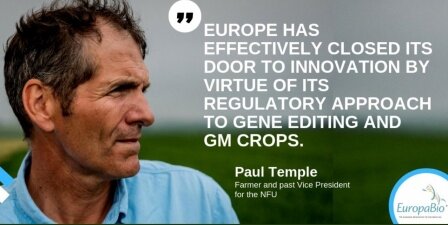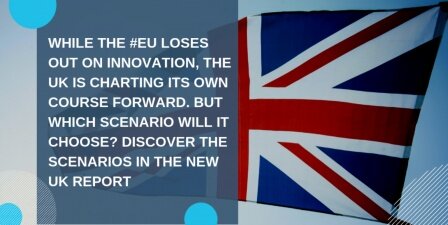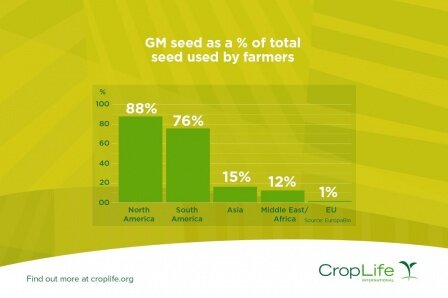The trade in genetically modified feed is of crucial importance to the UK agriculture sector, as it is across the EU. It is estimated that around 90 percent of all soybeans imported to the EU are GM varities.
As the UK leaves the EU it is vitally important that this trade is maintained, to ensure certainty for the UK livestock sector. The UK should also carefully consider the opportunities for boosting agri-tech in the UK through future trade deals.
Currently all genetically modified crops (GMOs) go through a strict pre-market authorisation system before being put on the EU market either as part of imported agricultural commodities harvested outside the EU, or as seeds for cultivation in the EU. To find out more about the EU process, please see the EuropaBio website.
Choices at the Post-Brexit Crossroads: Determining the Future of Plant Genetics in the UK
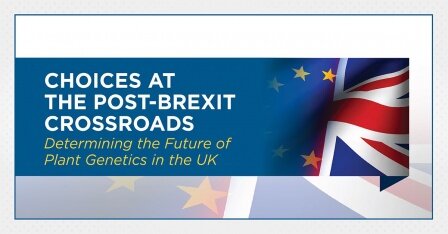 24-08-2018 REPORTS
24-08-2018 REPORTS
The EU Protein Gap: trade policies and GMOs
The EU’s new Common Agricultural Policy is expected to define an ambitious strategy to promote protein crops whilst reducing dependence on external sources. This new EuropaBio brochure highlights how trade of imported GM crops will remain vital for ensuring a sustainable supply of protein. Bridging the ‘protein gap’ will require non-discrimination in trade and investment in research and innovation at home. Read More
 14-06-2018 PRESS RELEASES
14-06-2018 PRESS RELEASES
‘Transparency’ proposal should build trust for innovation
In response of the European Commission’s proposed new legislation to improve transparency and sustainability of the EU food and feed risk assessment, EuropaBio highlights the need to inform the wider public about real versus perceived health threats, and to tackle disinformation, so that consumers can rest assured that their food is safe. The updated position paper recommends to 1. Build on EFSA’s robust risk assessment; 2. Increase transparency of internal processes; 3. Adopt good practices from EMA for more efficiency; 4. Improve communication and tackle misinformation. The European Parliament and Council of Ministers have started to debate the proposal, with a view to adopting a version of it in early 2019. Position summaries are available here in English, Italian, Spanish and German.
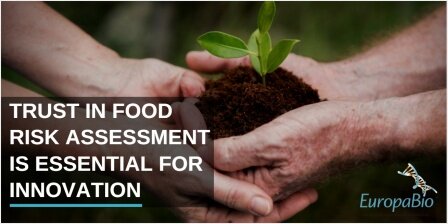 22-02-2018 VIDEOS
22-02-2018 VIDEOS
Watch: Opportunities for agricultural biotechnology in the UK
This animation highlights the potential of the agricultural biotechnology sector to boost jobs, exports and the wider economy post-Brexit. This can be realised by building on the existing strength of the UK’s science base and pursuing more proportionate, science-based regulation of agricultural biotechnology. Acknowledging the existing requirement for GM products in the UK food chain, and the level of research into plant science in UK labs.
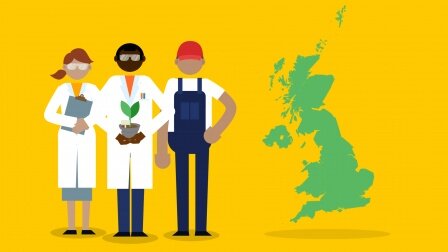 21-02-2018 REPORTS
21-02-2018 REPORTS
Cultivating the Future: How can 20 years of GM debate inform UK farm policy?
Cultivating the Future is a series of essays authored by leading plant scientists, academics, trade bodies and politicians, celebrating numerous breakthroughs in plant technology and pioneering new approaches to food and farming since the first commercialisation of GM crops over 20 years ago. [...]
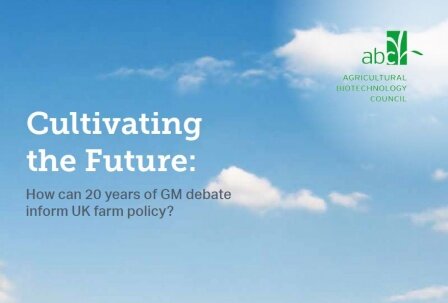 28-04-2017 FACTSHEETS/INFOGRAPHICS
28-04-2017 FACTSHEETS/INFOGRAPHICS
EU Member States and GMOs
What they say and what they do.
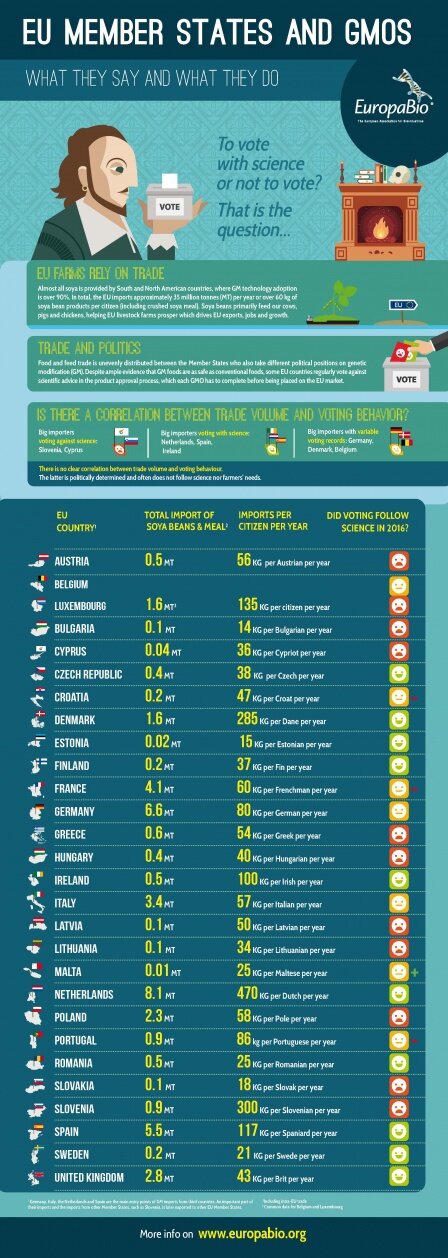 01-04-2016 FACTSHEETS/INFOGRAPHICS
01-04-2016 FACTSHEETS/INFOGRAPHICS
GMO import bans would cost Europe dearly
Quantifying the economic damage that GM import bans would cause to EU & MSs
 16-10-2015 FACTSHEETS/INFOGRAPHICS
16-10-2015 FACTSHEETS/INFOGRAPHICS
The benefits of GMO trade
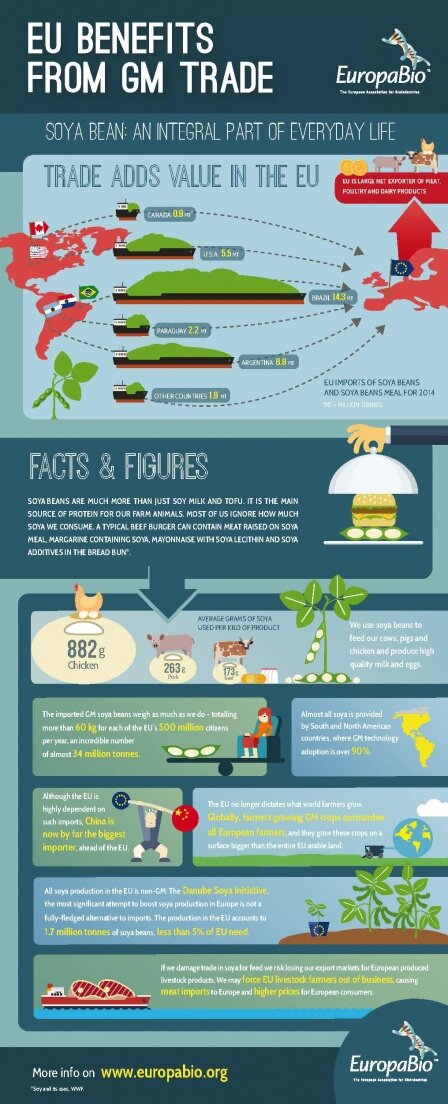 25-06-2015 VIDEOS
25-06-2015 VIDEOS
"Europe à la carte?": Best of video
Participants of EuropaBio conference discuss EU's dependency on GM imports, how the EC proposal to allow national bans could affect trade the internal market
27-05-2015 VIDEOSVIDEO: GMO Imports: modifying the genetics of the internal market?
Video includes interviews with Beat Späth (EuropaBio), IFOAM-EU (organic sector) and Canadian ambassador, all suggesting national import bans make no sense!
07-05-2015 VIDEOSThe Journey of Mr. Maize to the EU
How do EU policies and procedures, including risk assessment, on biotech crops impact trade and the EU economy, including EU livestock farmers?
02-07-2012 VIDEOSBureaucratic Barriers to Biotech
Despite past scientific successes, Europe is losing out on innovation. This is hurting innovation in agriculture and leading to a brain drain of scientists leaving the continent.
Highlights
The EU Parliament’s GMO dilemma 06-02-2019
Faces of farming highlight the opportunity for agriculture post-Brexit 16-10-2018
Why innovation should matter on World Food Day 10-10-2018
UK report makes the case for ‘bringing back’ science to agriculture post-Brexit 05-09-2018
EU falling further behind on ag innovation
The GMOinfo website is a pan-European initiative supported CropLife Europe and partners from across Europe, to provide factual information about GMOs to Europeans in their own language.

